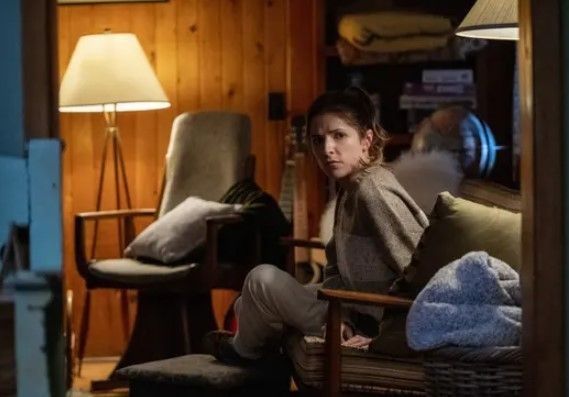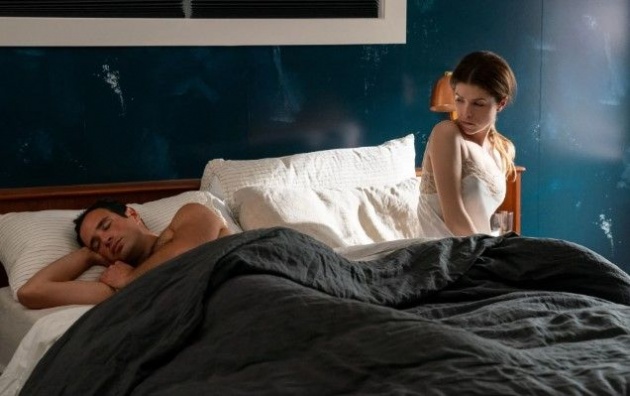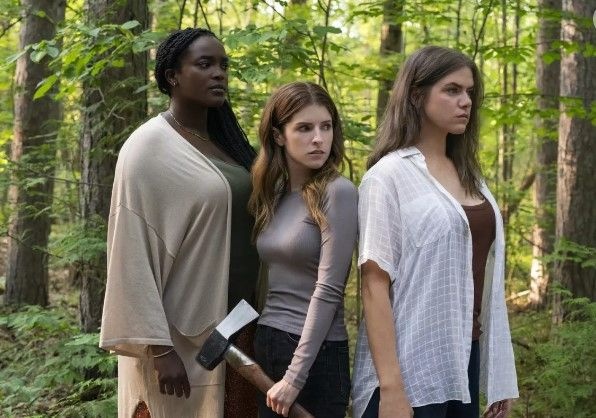
Pictured: Unsettled Alice (Anna Kendrick) has difficulty spending time with her friends in a scene from the drama, 'Alice, Darling', written by Alanna Francis and directed by Mary Nighy. Still courtesy of Lionsgate Films (UK/US)
About as far from the box-office success of Barbie as one can reasonably imagine is Alice, Darling. Written by Alanna Francis and directed by Mary Nighy, this is another American film about female empowerment, albeit one that comes from a very dark place. Released by Lionsgate Films, the company behind John Wick Chapter IV – worldwide gross $432 million and counting - it only was screened in the UK once or twice a day in a handful of independent cinemas in January 2023, having no prospect of commercial success. Happily, it has found its way onto Amazon Prime, which also hosts another Lionsgate release, Living, starring Nighy’s award nominated father, Bill.
Nighy might unkindly be described as a nepo-baby. However, there have been numerous offspring of famous actors and directors who have carved out successful careers through virtue of their talent – Maggie and Jake Gyllenhaal, the children of director Stephen Gyllenhaal and screenwriter Naomi Foner to name but two. Nepotism is an issue in the film industry at the entry level – check out the names of production assistants or second assistant directors – but you can’t let just anyone take charge of a feature film just based on a family connection, unless of course the director’s parent is directly involved. Taking charge of a film requires a vision and the ability to answer 200 questions a day, excluding ‘what do you want from the craft wagon?’ You can’t fake your way through it.
Alice, Darling owes its existence to a third woman, star Anna Kendrick, whose six-year relationship with an allegedly coercive-controlling British cinematographer between 2014 and 2020 forms if not the inspiration then a touchstone for the film. Kendrick is known for musical comedies (the Pitch Perfect trilogy) as well as New Moon, Eclipse and Breaking Dawn in the Twilight ‘vampires verses werewolves’ series. In Alice, Darling, her character has to be coaxed to sing – and then her performance is filmed in long shot. This is not another Trolls movie.
The film represents a marketing challenge. There have been films about women attempting to escape abusive relationships, but they tend to be thrillers - Sleeping With The Enemy is one commercially lucrative example. Francis and Nighy pace their film like a drama, in which the titular character avoids doing things. It signals a thriller ending – and takes place against the backdrop of a search for a missing girl – but then subverts it. Moreover, the film isn’t based on a best-selling novel. Nor does it feature a star doing what they are best known for.
A great film doesn’t need a commercial hook. It does, however, need to ask the right question in a coherent and relatable way. Here, that question isn’t, ‘why stay in a coercively controlled relationship?’ Rather, ‘why do my closest friends and family not see I’m in a coercively controlled relationship and help me escape it?’
In the film, which begins in the city, Alice (Kendrick) lives with the neurotic British artist, Simon (Charlie Carrick) who – and here’s the kicker - doesn’t like her friends. He has a passive-aggressive approach to separate her from them. ‘They don’t know you’, he insists, encouraging Alice to believe that she can only be her authentic self with him. Alice has two besties, Tess (Kaniehtiio Horn), an artist going through a lean period and Sophie (Wunmi Mosaku) who is the peacemaker. Tess is reaching a milestone birthday – we’re not told the number, but it’s north of twenty-one – and Sophie thinks it’s the best idea for the three of them to get away for a week to stay in a log cabin, drink wine, paddleboard and hang out without the pressures of work or relationships. Significantly, Sophie appears to have neither work nor a relationship but is there to demonstrate the correct way to swing a maul. Alice describes the maul as an axe. It’s a simple mistake, don’t be judgmental.

Pictured: 'Why do I stay with this guy?' Simon (Charlie Carrick, left) sleeps while Alice (Anna Kendrick) contemplates her relationship in a scene from the drama, 'Alice, Darling', written by Alanna Francis and directed by Mary Nighy. Still courtesy of Lionsgate Films (US/UK)
Obeying the screenwriting rule, ‘always begin in the middle’, the film opens with Alice’s legs trailing in the water before she jumps in. The water represents sexuality as entrapment, dragging Alice down. Except that it isn’t Alice’s desire that is the problem, rather her investment in an individual who erodes her sense of self-worth in order to make himself indispensable to her. This is the modus operandi of a controlling narcissist, who prefers to be admired rather than loved and cannot love others; the self is all-consuming. Narcissists portray themselves as the smartest people in the room; actually they are the ones seeking the most attention, so you hear from them at a party more than actual clever people. Wit is no substitute for insight, an observation that haunts me constantly.
Coercively controlling people present themselves as caring and attentive, when actually they are neurotic and suffocating. They make their partners feel that they are constantly at fault, so much so that the partner often has no option but to transgress. This is what happens in Alice, Darling. Alice lies to Simon about a work trip and its duration in order to join her friends in a log cabin.
Near the beginning of the film, Alice catches the attention of a waiter (Ethan Mitchell) by ordering something different, that is, not sharing Tess and Sophie’s bottle of wine. She creates the conditions for him to linger, which is taken as an expression of her wanting to spend time with him. Naturally, Alice finds his cell number in her pocket. She quickly washes away the ink, disposing of any trace of it, imagining that Simon will find the note. Simon is the kind of narcissist who likes to remind Alice of his existence while she is out with others and insists on being sent a photograph of her cleavage. While coercively controlling men undoubtedly do this, it is usually early in the relationship. I felt this was over-egging the point. Perhaps, though, such men insist on being reminded of their partner’s appeal several years into the relationship, but I would have thought that Simon would have quite the collection of photos already. The scene simultaneously appals and grates. Simon’s behaviour in other scenes is enough of an illustration that he is an ass.
For his first appearance, Simon surprises Alice in the shower, as if he has urges that cannot wait. He doesn’t consider the opposite – Alice coming up behind him and covering his eyes while shaving. This scene is enough to convince us of his selfishness. In a later scene, he goes into a café to fetch breakfast while Alice waits outside, insisting that she can have something sweet even though Alice asks about the effect of sugar. After leaving the café with coffee and pastry, he complains about not being known there. Alice considerately adds that they don’t know her either, but when you leave your partner outside while you make the choices, you are going to get frosty looks.
Simon has an art opening to which Tess and Sophie are invited – Alice has added them to the list. Tess doesn’t show, ostensibly because she hasn’t reached Simon’s level of success as an artist but more because she doesn’t approve. Sophie thanks Simon for the invite and we feel Simon’s (narcissistic) inner cringe. Alice doesn’t spend much time with Sophie at the opening, eventually catching up with her on the street as Sophie is about to leave.
‘Noone turned up,’ whines Simon afterwards, ‘Noone that matters.’ Alice is consoling. We sense that Simon blames Alice for the perceived absence of important people, perhaps because he spent so much time keeping Alice away from Sophie that he could not promote himself adequately enough. At any rate, it is his problem. Alice meanwhile has rehearsed telling Simon that she is going away on a work trip – then tells him for real, which he accepts reluctantly. This is a lie that drives her guilt. We see Alice curl her hair around her finger and later pull her hair out of her head. This isn’t a figure of speech; she achieves the best results when her hair is wet.
Francis and Nighy don’t directly address the question, ‘how can you not see that your friend is a coercive relationship?’ However, there are a few arguments between Tess and Alice about what counts as normal behaviour.
A third of the way into the film, we learn that a girl has gone missing in the locality where Alice and her friends are staying. Alice sees a notice outside a local store. In the ensuing scenes, Alice is drawn into the search for her. Her guilt about being with her friends, whose company she cannot enjoy, needs to be assuaged.
The deployment of a crime movie trope – the threatened appearance of a kidnapper or murderer – does unbalance the film. We expect Alice to become involved with someone connected to the disappearance. Not knowing that she has joined the search, her friends take an activist role in shaking Alice out of her torpor. First, Alice’s phone and bag disappears, prompting a frantic search. It becomes clear that Tess and/or Sophie have hidden her phone to prevent her from receiving messages from Simon. Then Tess dumps Alice in the water while they are out on a paddleboard. Alice loses an earring, one that Simon gave her, and plunges several feet underwater to find it. ‘It’s thirty feet deep,’ Tess tells her. Alice wants to leave but Tess hasn’t celebrated her birthday yet, and Sophie has bought fireworks.
Alice is constantly reminded of Simon – there are smash cuts to earlier scenes in the film to suggest her anxious state of mind. The hair-pulling becomes more wince-inducing. It becomes clear that Alice is metaphorically twinned with the missing girl. While she is dwelling on how Simon will respond to her deceit, she is literally missing from her friends. By helping to find the girl, she may help to find herself.
We see the purpose of the crime movie trope, even though it has more associations than the filmmakers can deal with. In one scene, Alice follows a narrow path into a secluded piece of forest, discovers some lip balm and then enters an abandoned house to be surprised by some birds trapped in a room. She flees the house, screaming. She also applies the balm to her own lips; some audience members may ‘eww.’ This is the nearest the film gets to being a thriller. In the final act, having not received any reply to his messages, Simon turns up – his appearance is extremely unlikely. He has been shopping though one of his bags breaks, a cue for Alice to scurry after him and for the party to be truly over. Simon even makes a point of serving meat raw; his way of saying, ‘take that, sisters’.

Pictured: Taking a maul to a gum fight, Sophie (Wunmi Mosaku), Alice (Anna Kendrick) and Tess (Kaniehtiio Horn) in a scene from the drama, 'Alice, Darling', written by Alanna Francis and directed by Mary Nighy. Still courtesy of Lionsgate Films (US/UK)
A maul introduced in Act One is put to use in Act Three in a genuinely surprising way, whist Simon is complaining about cyclists. The ending eschews melodrama for something close to reality. There is a stand-off. Critically, though, Alice’s agency is exercised in a moderate way, proportionate to her behaviour in the film.
Alice, Darling is a film about the slow journey to self-worth, told with a not wholly satisfying mix of contrivance and well-observed behaviour. It is, at best, half-true. The film suffers from Sophie’s character being barely sketched in – I wanted her to really go for Alice after she briefly disappeared – and for the grafted-on disappearance sub-plot, with Simon bringing it to a conclusion. Kendrick is utterly believable as a woman caught up in her own (barely hidden) inner turmoil. The film would have reached more people if it had not flirted with a commercial genre. By making a half-believable film with some good scenes, Nighy and Francis do reflect something of real experience, arguably more than many other films. Even though they acknowledge genre, they do not provide its pleasure, that cathartic whoop.
Reviewed on Amazon Prime Home Streaming Service, Friday 28 July 2023



